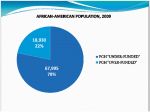Federal Community Development Bloc Grants were designed during the Carter administration as a mechanism to revitalize depressed urban neighborhoods. Increasingly, however, cities like Pittsburgh used the funds to pay salaries for administrators, buy equipment or pave roads—and rarely roads in the qualifying neighborhoods.
Now Pittsburgh councilman Rev. Rickey Burgess has had enough. He has introduced legislation that would require the grant funds to be allocated and used as intended.
 |
“They’ve been doing this for 30 years and my legislation calls for these practices to end,” he said. “The purpose of CDBG funds is to enhance poor communities. I’m saying the city deliberately under-funds needy neighborhoods.”
During a May 5 post-agenda council meeting, Rev. Burgess made his case with a PowerPoint presentation noting, among other things, that federal funds are to be used “on top of” not “instead of” municipal funds. This, he said, means the 86 eligible census tracts, making up 51 percent of the city’s area should be getting more funding than they have been.
The city of Pittsburgh receives, on average, $20 million in CDBG funds annually. Program administrator Rich Bellisario said the funds cannot be used for just anything, and there are checks on the system.
“Without saying every use is okay, we don’t have to use for it for housing or economic development or infrastructure,” he said. “For instance, it can go to salaries. My salary is paid from the program.”
CDBG funds, he said, are almost like a third budget, which is pulled from the city’s operating budget after it is approved and funneled through the Urban Redevelopment Authority. City council then enacts legislation authorizing spending.
“The money comes to us, we give it to the URA and they spend it,” he said. “But we have to okay it, and we can’t spend it without a contract. That gets reviewed by my director, the law department, the mayor and the controller’s office, and ultimately I have to account to HUD for every dime I spend.”
Even so, Rev. Burgess said, poor neighborhoods are being short-changed, adding the most obvious place to see the inequity is in street paving.
Between 2005 and 2009, the city spent $32 million of its revenues and $9 million in CDBG funds on paving. Yet the poorest 51 percent of the city received just 41 percent of paving funds. This means that only 25 percent of the local revenues went to the neediest neighborhoods.
“And who lives in that 51 percent? Well, 78 percent of the residents are African-American and 72 percent of the households are single-mother homes,” Rev. Burgess said. “And the unemployment rate is 11 percent. The bottom line—the city is in violation of the act.”
His legislation reads:
•No CDBG funds shall be used to supplant local general fund revenues for any purpose.
• All CDBG disburse-ments other than administrative costs must demonstrate an increased benefit to CDBG eligible communities.
•CDBG funds can be used to augment city services to address specific conditions, but not replace what the city would be obligated to provide for elsewhere in the operating or capital budgets.
Reverend Burgess said he expected his legislation to be back on the legislative docket and scheduled for a vote before the end of May.
(Send comments to cmorrow@newpittsburghcourier.com.)